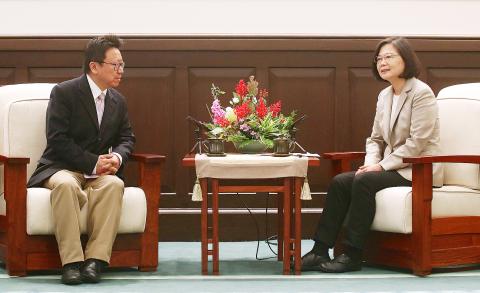The Mainland Affairs Council (MAC) yesterday urged Beijing to correct its “historical mistake” of the 1989 Tiananmen Square Massacre.
Today marks the 30th anniversary of the massacre, which began overnight on June 3, 1989, and continued through June 4 to brutally crush tens of thousands of students, workers and others who had been protesting in and around the square, calling for democracy, free speech and a free press.
For 30 years, the Chinese government has lacked the courage to reflect on the historical significance of the June Fourth Incident, choosing instead to “block information, distort the truth and attempt to cover up its mistakes and the events of 1989,” the council said in a statement.

Photo: CNA
China should face its historical mistakes, apologize and correct the incident so that the victims of the incident may “rest in peace,” it said.
Taiwan would continue to “lead the way” for the democratization of China, and support China’s move to democracy “in all manner of ways,” it said.
Hopefully, people in Taiwan and abroad would not forget the history and spirit of June 4, the council said, adding that “one day, the dawn of democracy will eventually come.”
The council also called on China to immediately release Taiwanese human rights advocate Lee Ming-che (李明哲), who is serving a five-year prison sentence in Hunan Province for “subversion of state power.”
Reflecting on Tiananmen, President Tsai Ing-wen (蔡英文) said that it was a shame that although China’s economic development has improved over the past few years, human rights there are still limited.
Speaking to a group of overseas democracy activists at the Presidential Office in Taipei, Tsai drew comparisons between today’s 30th anniversary of the massacre and the 40th anniversary of the Kaohsiung Incident, saying the two events were of crucial historic significance.
The Kaohsiung Incident was a crackdown by the then-Chinese Nationalist Party (KMT) authoritarian government on a demonstration organized by Formosa Magazine and its publisher — Legislator Huang Shin-chieh (黃信介) — and other pro-democracy advocates on Dec. 10, 1979, in Kaohsiung.
Taiwan’s democratization was fraught with difficulty, she said as she pointed to a photograph of Presidential Office Secretary-General Chen Chu (陳菊) when she was on trial in a military court for her role in the Kaohsiung Incident.
The direction and pace of development in Taiwan and China diverged after their respective incidents, with Taiwan firmly taking the path of democracy and freedom, while human rights and freedom have been severely constrained in China, Tsai said.
Taiwan will defend the values of democracy, and cares about the development of democracy and human rights in China, which are universal values that she hopes China would pursue, she said.
Additional reporting by Su Yung-yao, CNA and Reuters

A car bomb killed a senior Russian general in southern Moscow yesterday morning, the latest high-profile army figure to be blown up in a blast that came just hours after Russian and Ukrainian delegates held separate talks in Miami on a plan to end the war. Kyiv has not commented on the incident, but Russian investigators said they were probing whether the blast was “linked” to “Ukrainian special forces.” The attack was similar to other assassinations of generals and pro-war figures that have either been claimed, or are widely believed to have been orchestrated, by Ukraine. Russian Lieutenant General Fanil Sarvarov, 56, head

SAFETY FIRST: Double the number of police were deployed at the Taipei Marathon, while other cities released plans to bolster public event safety Authorities across Taiwan have stepped up security measures ahead of Christmas and New Year events, following a knife and smoke bomb attack in Taipei on Friday that left four people dead and 11 injured. In a bid to prevent potential copycat incidents, police deployments have been expanded for large gatherings, transport hubs, and other crowded public spaces, according to official statements from police and city authorities. Taipei Mayor Chiang Wan-an (蔣萬安) said the city has “comprehensively raised security readiness” in crowded areas, increased police deployments with armed officers, and intensified patrols during weekends and nighttime hours. For large-scale events, security checkpoints and explosives

PUBLIC SAFETY: The premier said that security would be tightened in transport hubs, while President Lai commended the public for their bravery The government is to deploy more police, including rapid response units, in crowded public areas to ensure a swift response to any threats, President William Lai (賴清德) said yesterday after a knife attack killed three people and injured 11 in Taipei the previous day. Lai made the remarks following a briefing by the National Police Agency on the progress of the investigation, saying that the attack underscored the importance of cooperation in public security between the central and local governments. The attack unfolded in the early evening on Friday around Taipei Main Station’s M7 exit and later near the Taipei MRT’s Zhongshan

REBUFFED: In response to Chinese criticism over recent arms sales, Washington urged Beijing to engage in meaningful dialogue instead of threats and intimidation Washington’s long-term commitment to Taiwan would not change, the US Department of State said yesterday, urging Beijing to stop pressuring Taiwan and engage in meaningful bilateral dialogues. The remarks came in response to a backlash from Beijing about Washington’s latest approval of arms sales to Taiwan. The US Defense Security Cooperation Agency said in a statement on Wednesday that the Taipei Economic and Cultural Representative Office in the US has asked to purchase an arms package, including Tactical Mission Network Software; AH-1W helicopter spare and repair parts; M109A7 self-propelled howitzers; HIMARS long range precision strike systems; tube-launched, optically tracked, wire-guided missiles; Javelin